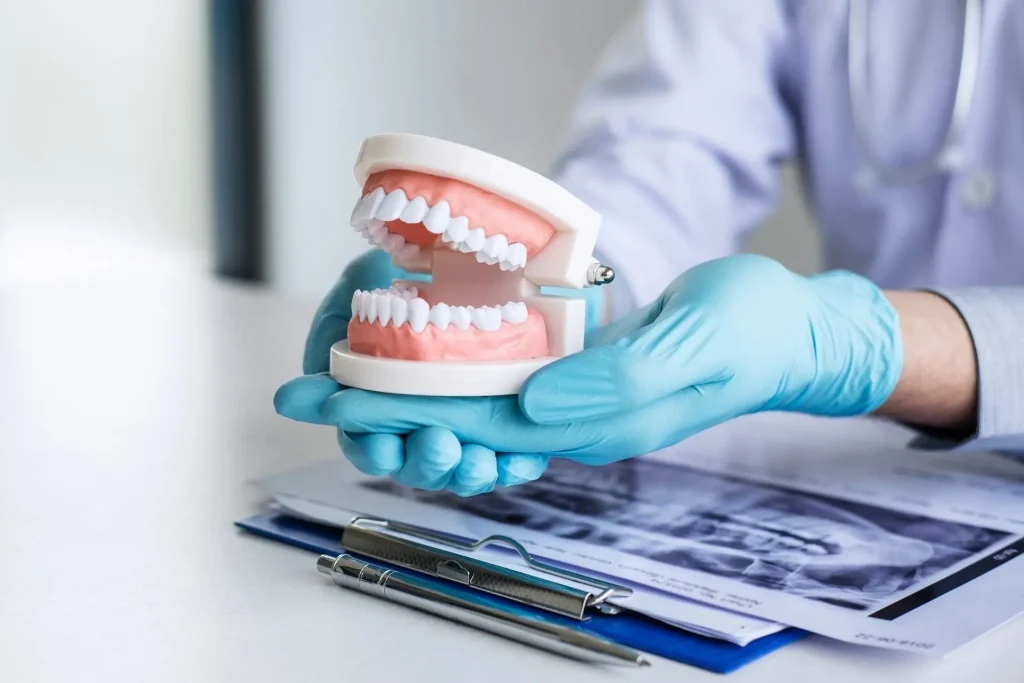Oral and Maxillofacial Surgery
EOT Clinic Ankara
Proven Solutions
As a close follower of ever-evolving technology, we support your health with proven solutions.
Wide Product Range
We are here for you with our technological tools, devices and materials that directly support your dental health.

What is Oral and Maxillofacial Surgery?
Oral and Maxillofacial Surgery is a specialty that deals with the surgical treatment of the oral cavity, teeth, jaw bones and facial region. This discipline includes tooth extractions, implant applications, cyst and tumor surgeries, bone grafts, jaw fractures, orthognathic surgery and other complex surgical interventions. It offers comprehensive treatments for the mouth, jaw and face to solve both aesthetic and functional problems.
Basic Areas of Oral and Maxillofacial Surgery
1. Tooth Extraction and Difficult Tooth Extraction
Simple Tooth Extraction: Extraction of decayed, broken or moving teeth that require treatment.
Impacted Tooth Extraction: Surgical removal of impacted teeth, especially wisdom teeth (wisdom teeth).
Difficult Tooth Extraction: Tooth extraction with surgical techniques in cases where the roots are broken, adhere to surrounding tissues or have anatomical difficulties.
2. Dental Implants
Implant Placement Surgery: Surgical placement of titanium screws in the jawbone.
Bone Grafting and Sinus Lifting: Addition of bone in patients with insufficient bone tissue, elevation of the sinus floor.
Post Implant Care and Revision: Management of infection and complications that may develop around the implant.
3. Orthognathic Surgery (Jaw Correction Surgeries)
Correction of chewing, speech and aesthetic problems by correcting the position of the jaw bones.
Surgical correction of upper and lower jaw imbalances.
Advanced surgical interventions combined with orthodontic treatment.
4. Bone and Soft Tissue Grafts
Bone Graft: Adding bone tissue to areas of bone loss and preparing a suitable ground for implants and other treatments.
Soft Tissue Graft: Repair of intraoral soft tissue in gingival recession or defects.
5. Treatment of Intraoral Cysts and Tumors
Surgical removal of benign and malignant cysts.
Diagnosis and surgical treatment of facial and intraoral tumors.
Biopsy and pathological examination processes.
6. Trauma and Fracture Treatments
Detection, surgical repair and stabilization of facial and maxillofacial fractures.
Elimination of traumatic damage to teeth and bones.
7. Temporomandibular Joint (Jaw Joint) Diseases
Treatment of pain, dysfunctions and limited movement problems in the jaw joint with surgical interventions.
Arthroscopic surgery and other minimally invasive techniques.
Modern Techniques Used in Oral and Maxillofacial Surgery
Digital Imaging and Planning
3D Tomography (CBCT): Detailed three-dimensional examination of the jaw and facial bone structure.
Digital Surgical Planning: Pre-planning of surgical procedures with computer-aided design and simulations, reducing risks.
Minimally Invasive Surgical Techniques
Methods with smaller incisions, less pain and faster healing.
Endoscopic and laser-assisted operations.
Regenerative Surgery Applications
Biological materials and growth factors that promote the natural regeneration of bone and soft tissue.
Oral and Maxillofacial Surgery Treatment Process
1. Preliminary Assessment and Diagnosis
The patient’s complaints are taken in detail.
Clinical examination, radiologic imaging and, if necessary, laboratory tests are performed.
A treatment plan is created.
2. Surgical Intervention
Procedures are performed under local anesthesia, sedation or general anesthesia.
Postoperative pain, swelling and bleeding are controlled.
3. Recovery and Follow-up
The healing process is monitored with regular check-ups.
Patient-specific care recommendations are provided to prevent complications.
Things to Consider After Oral and Maxillofacial Surgery
Maximum attention should be paid to the hygiene of the operation area.
Medications recommended by the doctor for pain and swelling should be used regularly.
Hot food and drinks should be avoided in the first days.
Physical activities should be restricted and the healing process should be supported.
Any abnormality or severe pain should be referred to a surgeon.
Common Problems in Oral and Maxillofacial Surgery
Impacted wisdom teeth: Can cause pain, infection and jaw deformities.
Jaw Cysts and Tumors: Early diagnosis and treatment is very important.
Jaw Fractures It occurs as a result of traumas such as traffic accidents and falls.
Implant Complications: Infection, bone loss or implant failure may occur.
Why Should You Consult a Specialist Oral and Maxillofacial Surgeon?
Complex and delicate surgical procedures require expertise.
Incorrect intervention can lead to functional and aesthetic problems.
Up-to-date technologies and methods only work best with specialized teams.
Postoperative care and follow-up are essential for successful treatment.
Conclusion and Recommendations
Oral and Maxillofacial Surgery is a specialty that directly affects the quality of life of patients and requires detailed planning and experience. We offer a wide range of services from all kinds of tooth extractions, jaw fractures, implant placement to tumor surgery. We protect your healthy and aesthetic oral structure with modern technology and personalized treatment plans.
EOT Clinic Ankara
Current Content
With our current posts, we aim to both support and inform your health. You can also benefit by reviewing our content prepared in this direction.
You can contact us
You can reach us and get support whenever you need via our WhatsApp button on the right.



